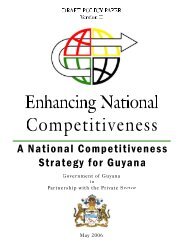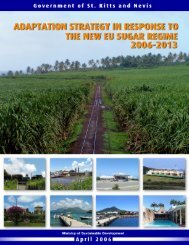Business Removing
Doing Business in 2005 -- Removing Obstacles to Growth
Doing Business in 2005 -- Removing Obstacles to Growth
- No tags were found...
Create successful ePaper yourself
Turn your PDF publications into a flip-book with our unique Google optimized e-Paper software.
59<br />
Enforcing contracts<br />
Who is reforming courts?<br />
What to reform?<br />
Why reform?<br />
“I have had a company for 10 years. I’ve brought 15 cases<br />
against customers for nonpayment, but I’ve never been<br />
able to win a judgment. The courts are full of cases. The<br />
rats eat the paper. The courts lose volumes of cases. Our<br />
cases are not big enough to pay the bribes judges would<br />
accept. So we don’t bother, we just can’t collect our<br />
debts.” 1 These are the words of Facundo, a businessman<br />
in Buenos Aires. They may as well be the words of an entrepreneur<br />
in Bolivia, Indonesia, Lebanon, Poland or<br />
Serbia and Montenegro, countries where debt collection<br />
through the courts takes years.<br />
Why do courts in so many developing countries perform<br />
so poorly? The problem is not the quality of judges<br />
or the lack of resources. More training and more resources<br />
would help. But the main reasons lie elsewhere. A<br />
striking difference between courts in most developing<br />
countries and those in OECD countries is the overly bureaucratic<br />
judicial procedures that judges and litigants<br />
face when resolving a dispute (figure 8.1). It takes 58 procedures<br />
for a creditor to collect her debt in Sierra Leone<br />
but only 11 in Australia, and 55 procedures in Egypt but<br />
only 14 in Norway. Each additional procedure costs more<br />
time and money. Frequently, bribes change hands to<br />
move the process along. In Cambodia, for example,<br />
judges top the list as the most corrupt public servants. 2<br />
In many countries only the rich can afford resolving<br />
disputes through the courts. For the rest, justice is out of<br />
reach. In Venezuela recovering an overdue debt of<br />
$8,000 (twice the annual income per capita) would often<br />
cost $2,500 in court and attorney fees. In the Philippines<br />
the creditor might pay as much as $1,000 to recover a<br />
debt worth $2,000. In Indonesia the fees for collecting a<br />
debt of $2,000 can be higher than the amount claimed.<br />
<strong>Business</strong>es have little incentive to use the courts.<br />
In the absence of efficient courts, fewer investments<br />
and business transactions take place (figure 8.2). Those<br />
that do involve a small group of people linked through<br />
kinship, ethnic origin or previous dealings. This substantially<br />
reduces the economic benefits that come from trade.<br />
Some would argue that more formality in dispute<br />
resolution ensures that due process is followed and justice<br />
is done. The evidence suggests otherwise. The more<br />
complex the procedures for resolving disputes, the less<br />
likely firms are to report that judges are impartial and<br />
court decisions fair. 3 In the words of the former Assistant<br />
Attorney General of Mexico: “It is often stated that<br />
delay in the administration of justice is equivalent to a<br />
denial of justice. If this is so, Mexico is plagued by de-<br />
FIGURE 8.1<br />
Courts in poor countries are inefficient<br />
Cost and time to enforce a contract<br />
35 Poor<br />
countries<br />
Cost<br />
(court and legal fees<br />
as a percentage of debt value)<br />
Source: Doing <strong>Business</strong> database.<br />
18 Middle income<br />
421 Poor countries<br />
countries<br />
417 Middle income<br />
countries<br />
12 Rich<br />
280 Rich<br />
countries<br />
countries<br />
Time<br />
(days from filing<br />
to enforcement)

















